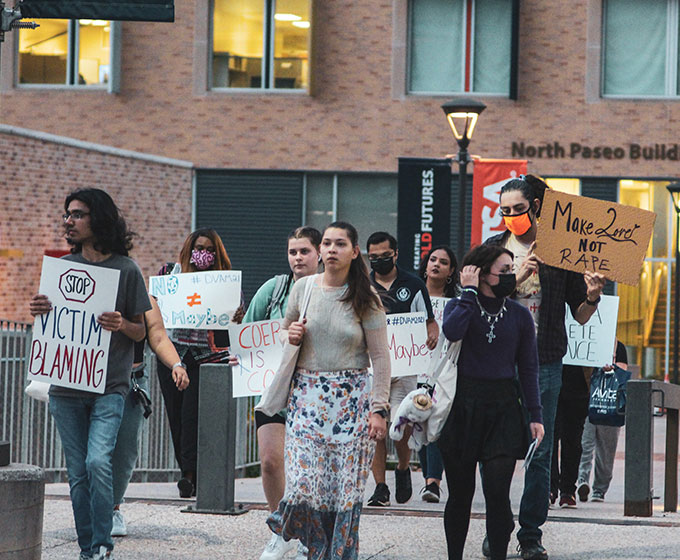
Students march through campus as part of the Take Back the Night event.
SEPTEMBER 30, 2022 — UTSA has received a three-year, $300,000 Campus Program grant from the U.S. Department of Justice (DOJ) to expand programming aimed at reducing incidents of domestic violence, dating violence, sexual assault and stalking among college-aged students.
UTSA was the only Texas institution that received a grant as part of a larger $10.7 million award from the DOJ’s Office on Violence Against Women (OVW) to help 36 colleges and universities advance their sexual assault prevention efforts.
The DOJ’s Campus Program grant will enable UTSA to expand its existing advocacy programs and develop new programs on campus to prevent sexual violence. At the same time, the funding will provide an opportunity for UTSA to create a more cohesive response to support survivors of sexual misconduct/sexual violence.
“UTSA is committed to cultivating a safe environment where students, faculty, staff and visitors thrive,” said LT Robinson, UTSA senior vice provost for student affairs and dean of students. “This funding is a testament to our institution’s deep commitment to foster an environment that does not tolerate sexual violence. We are committed to creating a culture of respect.”
The UTSA PEACE Center, part of Wellbeing Services, educates the campus community about sexual assault prevention and provides support to students who have experienced sexual violence or intimate partner violence. The center’s trauma-informed advocates provide confidential services including crisis intervention, safety planning, reporting option education and emotional support. These staff members also offer educational programs to the campus community to promote a healthy and safe environment.
The DOJ funding will enable UTSA to establish a new Coordinated Community Response Team (CCRT) that will collaboratively assess and respond to incidents of sexual assault and violence. Members of the CCRT will include representatives from the Office of the Provost, Office of the Dean of Students, Housing and Residence Life, UTSAPD, Campus Based Victim Services, Clery Act Compliance, Title IX and EOS and Wellbeing Services.
Additionally, the project calls for the UTSA PEACE Center to collaborate with community partners including the District Attorney’s Office and the Hill Country Crisis Council in Kerrville, Texas.
The CCRT advances the President’s Initiative on Preventing Sexual Assault and Misconduct that has been underway at UTSA. Through the initiative, established in 2019 by President Taylor Eighmy, UTSA aspires to cultivate an environment that does not tolerate any form of sexual violence or harassment.
Since the launch of the presidential initiative, UTSA has broadened its programming and outreach efforts on sexual violence prevention topics, including consent education, bystander intervention and healthy relationships, and it has implemented an expansive set of training opportunities to equip students, faculty and staff with the tools for prevention and bystander intervention.
In fall 2019, UTSA became the first university in the nation to implement the Tracy Rule. The most comprehensive Serious Misconduct rule in the NCAA, the measure attaches student-athlete eligibility to behavior. It is named for Brenda Tracy, a sexual assault survivor, public speaker and founder of the national campaign and nonprofit, SetTheExpectation.
Additionally, the university has implemented Green Dot, an anti-violence initiative to help students understand the strategies and tools they can use to prevent power-based personal violence in their own ways on campus, and has joined the Culture of Respect Collective, a cohort of 37 institutions of higher education dedicated to ending campus sexual violence who will engage in a rigorous process of self-assessment and targeted organizational change.
The DOJ’s Campus Program was created by Congress in recognition of the unique issues and challenges that colleges and universities face in preventing and responding to sexual assault and misconduct. The program encourages a comprehensive coordinated community approach that enhances victim safety, provides services for victims and supports efforts to hold offenders accountable.
“One of OVW’s top priorities is to improve our outreach and services to underserved communities,” said Allison Randall, OVW acting director. “We recognize that HBCUs, HSIs and TCUs face unique issues and challenges in preventing and responding to campus violence and we’re honored to work with grantees in 2023 and in the years to come to support survivors.”
UTSA Today is produced by University Communications and Marketing, the official news source of The University of Texas at San Antonio. Send your feedback to news@utsa.edu. Keep up-to-date on UTSA news by visiting UTSA Today. Connect with UTSA online at Facebook, Twitter, Youtube and Instagram.
Move In To COLFA is strongly recommended for new students in COLFA. It gives you the chance to learn about the Student Success Center, campus resources and meet new friends!
Academic Classroom: Lecture Hall (MH 2.01.10,) McKinney Humanities BldgWe invite you to join us for Birds Up! Downtown, an exciting welcome back event designed to connect students with the different departments at the Downtown Campus. Students will have the opportunity to learn about some of the departments on campus, gain access to different resources, and collect some giveaways!
Bill Miller PlazaCome and celebrate this year's homecoming at the Downtown Campus with food, games, giveaways, music, and more. We look forward to seeing your Roadrunner Spirit!
Bill Miller PlazaThe University of Texas at San Antonio is dedicated to the advancement of knowledge through research and discovery, teaching and learning, community engagement and public service. As an institution of access and excellence, UTSA embraces multicultural traditions and serves as a center for intellectual and creative resources as well as a catalyst for socioeconomic development and the commercialization of intellectual property - for Texas, the nation and the world.
To be a premier public research university, providing access to educational excellence and preparing citizen leaders for the global environment.
We encourage an environment of dialogue and discovery, where integrity, excellence, respect, collaboration and innovation are fostered.